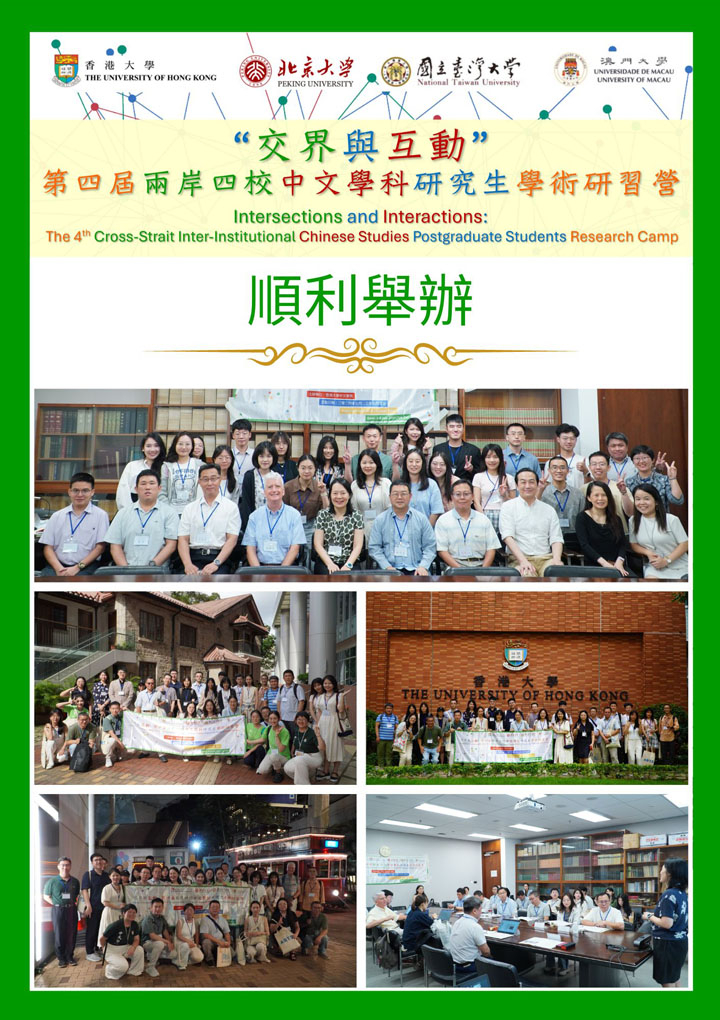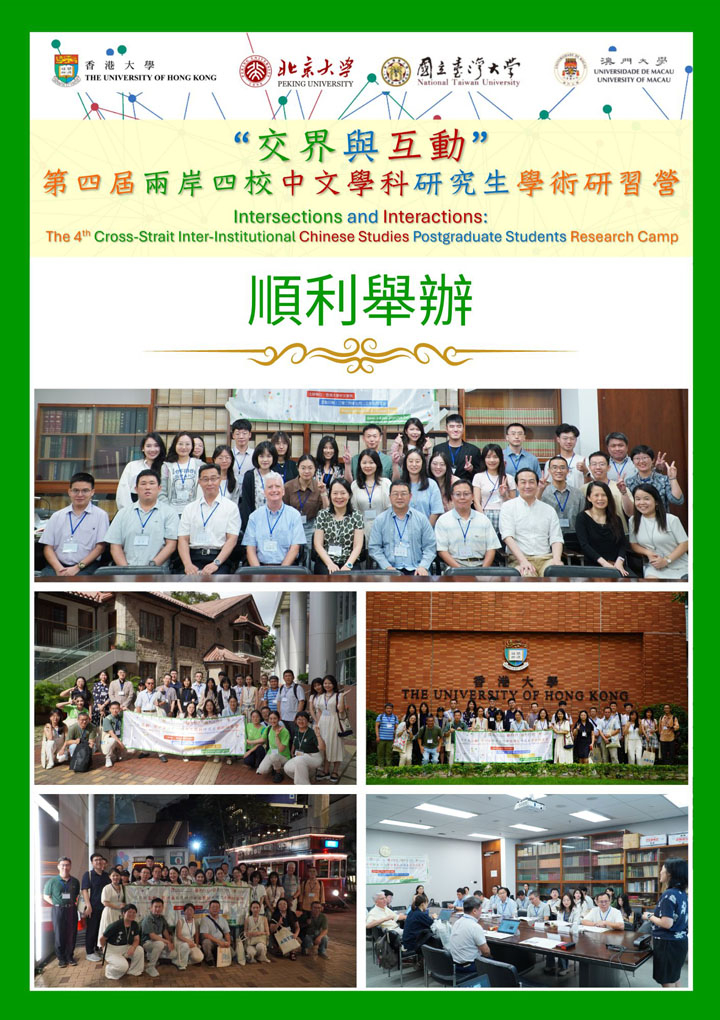The 4th Cross-Strait Inter-Institutional Chinese Studies Postgraduate Students Research Camp Successfully Held

From 2 July to 5 July 2024, the 4th Cross-Strait Inter-Institutional Chinese Studies Postgraduate Students Research Camp was successfully held at the University of Hong Kong (HKU). Organized by the School of Chinese (HKU) and themed “Intersections and Interactions”, the research camp brought together over 10 postgraduate students and teacher representatives of our school, as well as more than 20 postgraduate students and teacher representatives from Peking University (PKU), Taiwan University (NTU), and the University of Macau (UM) for academic discussions on Chinese Literature, History, Culture, and Linguistics.
The paper presentations were divided into eight panels, focusing on four major topics: “Premodern Literature, History and Philosophy”, “Linguistics”, “Locality”, and “Gender”. In the first panel named “Rituals and Philosophy in Pre-Qin Era” of the topic “Premodern Literature, History and Philosophy”, Mr. Chan Chok Meng (HKU) attempted to explicate ritual protocols described by the ode “Nuo” in the Eulogia of Shang, and provided a new take on the identity of “Tang sun” by rejecting previous interpretations; Ms. Liu Yongjia (HKU) analyzed the interactive relationship between “Cheng” and “Shen Du” from the inner aspect of “inner sincerity expressed externally”. In the second panel titled “Multifaceted Han Dynasty: Ritual System, Literature, and Sculpture”, Mr. Chang Yi-jan (NTU) probed Tsao Bao’s failure in enacting “New Rites” in Eastern Han Dynasty; Ms. Kan Xiaoyang (PKU) tentatively regarded Liu Xiang’s Shuo Yuan as a kind of political advice writing; Mr. Zhong Hong (UM) compared the shapes of Jing Ke’s dagger described in Han portrait stones and historical texts, and examined the evolution and circulation of these dagger shapes.
In the aforementioned topic’s third panel “Literature in Wei, Jin, Sui, and Tang Dynasties”, Ms. Yang Sisi (PKU) discussed the way how the meaning of “Luoyang” transformed from “wasteland” to “famous capital” in the literature of Eastern Jin and Southern Dynasties; Mr. Chen Bo-yen (NTU) re-interpreted the meanings, creations and circulations of Tang stories from the perspective of authors. In the fourth panel “‘Changes’ in Ming and Qing Periods”, Ms. Xie Wanyi (UM) observed the phenomenon that History Records gradually surpassed Han History in the middle and later period of Ming Dynasty, and finally became paradigm of classics of Qing Dynasty; Ms. Li Can (PKU) took The Imperial Capital Chapter as an example, examined the establishment of Beijing's image and status as the capital city in the poems of Ming Dynasty; Ms. Chen Jingyi (HKU) investigated the various portrayals of Li Zicheng through her comparison between Chinese and Western texts (written by missionaries) in late Ming and early Qing Dynasty.
The panel on linguistics is themed by “Linguistic Structure and Its Implications”, with all panelists from the University of Macau. They jointly discussed the methods of recognizing the quantitative change of tones, the ways of examining changes in tones of Cantonese (in conjunction with other changes) and the significance of ancient Chinese as a reference for the study of modern Chinese. Among them, Mr. Gao Xiang studied the phenomenon of abbreviation of discontinuous construction in language communication; Ms. Pan Yaoyao analyzed the syntactic differences between two types of S-P subject sentences, and the syntactic motivation and functions of the nominalizer “de”; Mr. Wang Han displayed his cognitive-oriented experiments which explored the merging of tones in Macau Cantonese.
The first panel on locality is “Hong Kong as a Space for Discourse Formation”. Mr. Huang Qiuhua (PKU) discussed the founding background and ideas of People’s Literature and Art Series so as to mark a turning point of modern Chinese literature; Ms. Zhang Huiyan (HKU) explored nationalism and masculinity in Hong Kong’s mandarin anti-Japanese films of the 1960s by using the film Sun, Moon and Stars as a case study; Starting from Yesi’s disengaged poetics, Ms. Liu Chia-jung (NTU) re-interpreted the writing motivations and forms of Yesi’s food poems; Mr. Wong Shing Kit (HKU) explicated Dung Kai-cheung's avant-garde genre practices and the pivotal significance of his novel Mingzi.
The second panel on locality is “The ‘South’ as a Lens”. In this panel, Ms. Zhou Junrou (PKU) focused on Taiwan’s memory narratives about the year “1949” since the new century, and teased out their changes from the social contexts and texts concerned; Mr. Huang Yen-chih (NTU) sorted out Li Lincan’s research on the history of Chinese paintings and writings about Jade Dragon Snow Mountain, so as to demonstrate how Li coped with political situations and re-constructed memories by prose writings; Mr. Su Xin (HKU) re-explored the concept “New South Writing” and pointed out its current problems and inner potentials; Ms. Li Shuyang (PKU) utilized the affect theories to elucidate Lin Zhao’s special efforts of constructing a “Sentimental South” in her work Chaoxi Tu.
The panel on gender, with the theme of “Women’s Bodies and Identities”, focused on different studies of females. Ms. Yao Yan (UM) organized various texts from Han to Tang Dynasty to examine the adaptation and supplementation of the story of Wang Zhaojun and her departure to the border; Ms. Xu Ning (HKU) analyzed the interactions between storytelling listening, female culture and oral-written traditions, by focusing on the illness experience of Fung Siu Ching, a talented female figure during the late Ming period; Ms. Lee Ting-xin (NTU) explored how issues such as female bodies and privacy were discussed in the public sphere, with examples of the feminine menstrual product advertisements in Shun-Pao in the 1920s.
Upon the completion of the postgraduate students’ presentations, esteemed professors including Prof. Hsu Sheng-hsin (NTU), Prof. Tang Siu Fu (HKU), Prof. Richard Van Ness Simmons (HKU), Prof. Song Yayun (PKU), Prof. Liu Hongyong (UM), Prof. Li Guohua (PKU), Prof. Olivia Milburn (HKU), Prof. Chen Liangliang (HKU), Prof. Yang Binbin (HKU) and Prof. Wei Yan (HKU), provided feedback and comments. The participants actively expressed their opinions, engaging in stimulating discussions that fostered a friendly and enthusiastic atmosphere.
Three professors were invited to give mini talks in response to the students’ presentations. Moderated by Prof. Lin Pei-yin, head of the School of Chinese (HKU), Prof. Zhang Yue (UM) analyzed literary texts that shaped the portraits of Liu Yu through the lens of cultural memories; Prof. Simmons discussed the evolution of Chinese dialects since the Tang Dynasty, demonstrating through specific cases how to trace phonetic changes from poetic rhymes; Prof. Chu Ming Kin (HKU) compared different historical texts to explain how Chief Councilor Wang Boyan in Southern Song was portrayed as a “nefarious” minister.
A roundtable discussion followed, where participants actively discussed the location and topics for the next research camp. Prof. Lin Pei-yin concluded the academic event with a closing speech, and representative teachers and students were invited to give short speeches expressing their feelings and gratitude. The research camp ended on a successful note.
In addition to facilitating academic interactions, the research camp also included a campus tour for attending teachers and students on the first day (2 July). Organizers guided participants through HKU’s main campus, the Fung Ping Shan Library, and the Special Collections of the Main Library, showcasing the university’s long history and experiencing its academic atmosphere that combines Chinese and Western cultures. Following the tour, participants enjoyed a tram ride arranged by the organizers, taking in Hong Kong’s iconic landmarks, bustling night scenes, and experiencing the diverse cultures of the local people.
Adhering to the principle of “intersections and interactions”, the research camp promoted in-depth discussions among teachers and students from different regions and research fields, as well as encouraged interactions and communications between senior scholars and young students. Laughter and thought-provoking ideas filled the entire research camp. It is hoped that cross-strait inter-institutional Chinese studies will continue for years to come, and the friendship forged among participants will last a lifetime.








